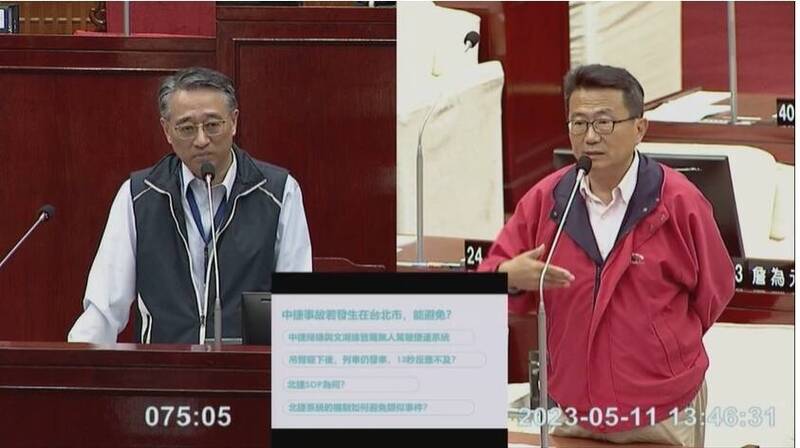Taipei City Councilor Wu Shizheng (right) requested that the Wenhu Line of the MRT should strengthen the track foreign object detection and early warning mechanism. Beijie Company General Manager Huang Qingxin (left) promised to improve it.
(The picture is taken from the live broadcast of the Taipei City Council website)
[Reporter Cai Yahua/Taipei Report] Taichung MRT had an accident yesterday when the boom fell off the track and the train crashed into the train. Zhongjie Company released the surveillance video today. It took 13 seconds for the train crew to find the obstacle and hit it. It was too late to manually brake and stop. It's a pity.
Taipei City Councilor Wu Shizheng pointed out that the Taipei MRT Wenhu Line and Zhongjie are both unmanned systems. Can they stop when obstacles are detected?
Huang Qingxin, general manager of Beijie Company, said frankly that the current detection system requires physical contact, and only when foreign objects are detected will they be disposed of.
Beijie: research radar or infrared detection
Wu Shizheng was very surprised when he heard about it. He asked the Beijie detection system to have an early warning mechanism and to remember the lessons of Zhongjie. Especially Beijie has a large number of passengers, so it must be dealt with seriously. If it happened in Taipei, the casualties would be even more serious. Huang Qingxin said, Indeed, the most important thing is detection. Consider using radar, imagery, or infrared to evaluate, so as to achieve early detection and play an early warning role.
Please read on...
Wu Shizheng mentioned in the afternoon questioning by the transportation department of the parliament that both the Wenhu Line and the Zhongjie train have unmanned driving systems. According to media reports, after the crane arm fell down, the Zhongjie train continued to depart. After 13 seconds, the collision occurred, and an automatic mechanism was in place. It should come in time, 13 seconds is not long or short, if a signal is received along the MRT line, 13 seconds may be too late to activate the brakes.
Huang Qingxin said that Beijie Company conducted an internal emergency review yesterday. The Wenhu Line has a security system. The train will not leave until the doors or platform doors are closed. It will go out, and the train has a detection rod between the stations. You can pull the handle on the door or platform door to stop the train from moving forward. In case of emergency, the on-site supervisor will be authorized to take decisive measures.
Wu Shizheng asked, if the train on the Wenhu Line has left the station, can it be stopped if an obstacle is detected?
Huang Qingxin said that foreign object detection requires physical contact. If it is horizontal in the air, it will not work. Although the naked eye can see it, the automatic system must detect contact with foreign objects.
Wu asked again, so the detection range is to touch the entity, isn't there a set distance?
Huang said frankly that no, the current system design is like this.
Wu Shizheng said bluntly that Beijie’s anti-collision mechanism needs to be improved. Today’s long-distance detection is no longer a problem. Monitors and secret recorders can detect things that can see far away. This will not be a problem and will be improved. It is a problem, which needs to be reviewed in the future.
The door is not closed or the power is cut off, and the emergency handle on the car is pulled up. It must be operated manually. Therefore, there must be a mechanism to detect foreign objects before manpower can deal with it. Therefore, the existing mechanism of Beijie is useless, and it will stop when it is touched. it's too late
Wu Shizheng said that Beijie’s early warning mechanism should be strengthened. There are already lessons learned from Zhongjie. The train should be equipped with a long-distance detection mechanism. .
Huang Qingxin said that Beijie will set the distance for foreign object detection, regardless of imaging or LiDAR, it will seek technical testing for refinement.
